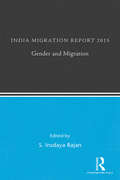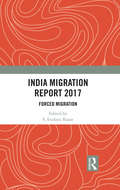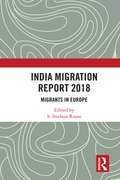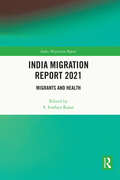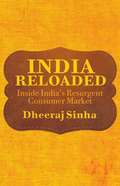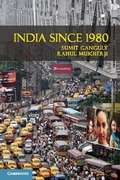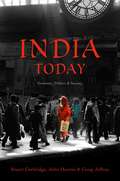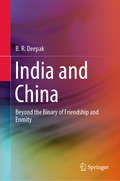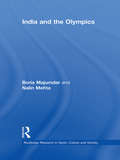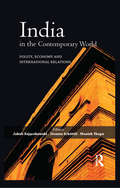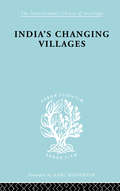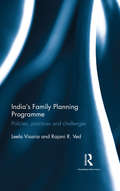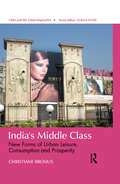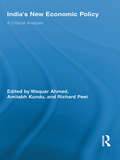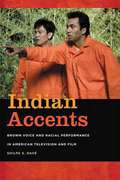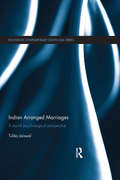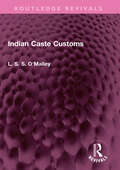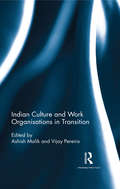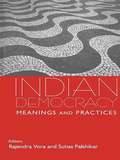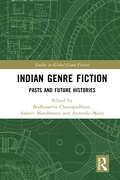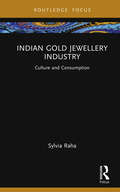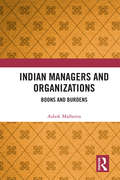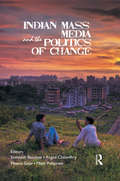- Table View
- List View
India Migration Report 2015: Gender and Migration (India Migration Report)
by S. Irudaya RajanIndia Migration Report 2015 explores migration and its crucial linkages with gender. This volume: • studies important issues such as irregular migration, marriage migration and domestic labour migration, as well as the interconnections of migration, gender and caste; • highlights the relationship between economics and changing gender dynamics brought about by migration; and • documents first-hand experiences of migrants from across India. Part of the prestigious annual series, this work will be useful to scholars and researchers of development studies, economics, migration and diaspora studies, and sociology. It will also interest policy-makers and government institutions working in the area.
India Migration Report 2017: Forced Migration (India Migration Report)
by S. Irudaya RajanThe India Migration Report 2017 examines forced migration caused by political conflicts, climate change, disasters (natural and man-made) and development projects. India accounts for large numbers of internally displaced people in the world. Apart from conflicts and disasters, over the years development projects (including urban redevelopment and beautification), often justified as serving the interests of the people and for public good, have caused massive displacements in different parts of the country, disrupting the lives and livelihoods of millions of people. The interdisciplinary essays presented here combine a rich mix of research methods and include in-depth case studies on aspects of development-induced displacement affecting diverse groups such as peasants, religious and ethnic minorities, the poor in urban and rural areas, and women, leading to their exclusion and marginalization. The struggles and protests movements of the displaced groups across regions and their outcomes are also assessed. This volume will be of great interest to scholars and researchers of development studies, economics, sociology and social anthropology and migration studies.
India Migration Report 2018: Migrants in Europe
by S. Irudaya RajanIndia Migration Report 2018 looks at Indian migrants in Europe and their lived experiences. It looks at how over the last few decades, the European Union has emerged as the preferred destination for Indian migrants surpassing the United States of America – and is home to Indian students and high-skilled professionals ranging from engineers to medical graduates, contributing to the economy and society both at the countries of origin and destination. The chapters in the volume look at a host of themes and issues, including agreements India has signed with the EU, the Blue Card, the impact of Brexit and the plight of unskilled workers. The volume will be of great interest to scholars and researchers of development studies, economics, sociology and social anthropology and migration studies.
India Migration Report 2021: Migrants and Health (India Migration Report)
by S. Irudaya RajanIndia Migration Report 2021 presents a detailed study on the health of migrants. It highlights major healthcare challenges faced by migrant labourers, especially in the context of the COVID-19 pandemic, which has forced authorities, policymakers and many other stakeholders to turn their attention to healthcare delivery unlike ever before. Bringing to the fore the health status of the migrant population both before the pandemic and during the pandemic, the essays in this volume discuss • the ease of access of migrant labourers to primary healthcare services; • the safety challenges faced by migrant workers at their workplaces, their exposure to various physical and psychological health vulnerabilities, and prevalence of potentially malignant health disorders and mental health issues among migrant labourers; • gendered access to healthcare, gender-based violence at workplaces and the gender-related perceptions on topics such as employment, decision-making and general attitude; • the role of decentralization and local self-government institutions in enabling health systems to address health problems of migrants, government policies and programs aimed at providing welfare for return emigrants from the Gulf; • the vulnerabilities migrant workers have encountered across the Indian states during the pandemic, with regards to food insecurity and psychological distress, and the type of support they received from various stakeholders. The volume will be of interest to scholars and researchers of development studies, economics, demography, sociology and social anthropology, and migration and diaspora studies.
India Migrations Reader
by S. Irudaya RajanThis volume brings together critical and landmark studies in Indian migration. Covers a range of key themes — emigration policy in countries of destination and origin, development and remittances, gender issues, impact of the global financial crisis, conflict, and inclusive growth Looks at new and emerging patterns in Indian migration Includes essays by major scholars in the field The book will be useful to scholars and researchers of development studies, migration and diaspora studies, economics and sociology. It will also interest policymakers and government institutions working in the area.
India Reloaded
by Dheeraj SinhaBrands and businesses from across the globe have tried to leverage the India opportunity, based upon simplistic and widely-held assumptions. This book takes a critical look at these myths and contradictions from an inside perspective, presenting a fresh and nuanced perspective on the opportunities that the Indian market offers. It draws upon a wealth of data, from consumer research, market data, macroeconomic research, popular culture and case studies, to provide a thorough and compelling insight into what makes for success in the complex Indian market, based upon two decades of experience.
India Since 1980
by Rahul Mukherji Šumit GangulyThis book considers the remarkable transformations that have taken place in India since 1980, a period that began with the assassination of the formidable Prime Minister Indira Gandhi. Her death, and that of her son Rajiv seven years later, marked the end of the Nehru-Gandhi era. Although the country remains one of the few democracies in the developing world, many of the policies instigated by these earlier regimes have been swept away to make room for dramatic alterations in the political, economic and social landscape. Sumit Ganguly and Rahul Mukherji, two leading political scientists of South Asia, chart these developments with particular reference to social and political mobilization, the rise of the BJP and its challenge to Nehruvian secularism and the changes to foreign policy that, in combination with its meteoric economic development, have ensured India a significant place on the world stage.
India Today: Economy, Politics and Society
by Craig Jeffrey Stuart Corbridge John Harriss<p>Twenty years ago India was still generally thought of as an archetypal developing country, home to the largest number of poor people of any country in the world, and beset by problems of low economic growth, casteism and violent religious conflict. Now India is being feted as an economic power-house which might well become the second largest economy in the world before the middle of this century. Its democratic traditions, moreover, remain broadly intact. <p>How and why has this historic transformation come about? And what are its implications for the people of India, for Indian society and politics? These are the big questions addressed in this book by three scholars who have lived and researched in different parts of India during the period of this great transformation.</p>
India and China: Beyond the Binary of Friendship and Enmity (G - Reference, Information And Interdisciplinary Subjects Ser.)
by B. R. DeepakThis book examines the changing dynamics of the issues between India and China in the wake of extensive globalisation, economic slowdown, the trade wars, Covid 19, Galwan and the undercurrents in the emerging new global order. Providing a comprehensive overview of India–China relationship and the role of the USA in the context of India’s economic and security cooperation in the region, it argues that India–China relations are too complex to be defined through the binary of friendship and enmity, since it includes an element of cooperation, competition, coordination and as well as conflict and confrontation. The book also opens new avenues for research. As such it is of interest to researchers and students of Asian studies, Asian history, China studies, peace and conflict studies and international relations.
India and the Olympics (Routledge Research in Sport, Culture and Society)
by Boria Majumdar Nalin MehtaIn most accounts of Olympic history across the world, India's Olympic journey is a mere footnote. This book is a corrective. Drawing on newly available and hitherto unused archival sources, it demonstrates that India was an important strategic outpost in the Olympic movement that started as a global phenomenon at the turn of the twentieth century. Among the questions the authors answer are: When and how did the Olympic ideology take root in India? Who were the early players and why did they appropriate Olympic sport to further their political ambitions? What explains India's eight consecutive gold medals in Olympic men’s hockey between 1928 and 1956 and what altered the situation drastically, so much so that the team failed to qualify for the 2008 Beijing Games? India and the Olympics also explores why the Indian elite became obsessed with the Olympic ideal at the turn of the twentieth century and how this obsession relates to India's quest for a national and international identity. It conclusively validates the contention that the essence of Olympism does not reside in medals won, records broken or television rights sold as ends in themselves. Particularly for India, the Olympic movement, including the relevant records and statistics, is important because it provides a unique prism to understand the complex evolution of modern Indian society.
India in the Contemporary World: Polity, Economy and International Relations
by Manish ThapaThis book brings together Indian and European perspectives on India’s polity, economy and international strategy. It explores internal, regional and global determinants shaping India’s status, position and goals in the early 21st century. Through an array of methodological and theoretical approaches, it presents debates on democracy, economic development, foreign and security policy, and the course of India–European Union relations. The volume will prove invaluable to scholars and students of international relations, politics, economics, history, and development studies, as well as policy makers and economists.
India's Changing Villages (International Library of Sociology)
by S.C. DubePublished in 1998, India's Changing Villages is a valuable contribution to the field of Sociology & Social Policy.
India's Family Planning Programme: Policies, practices and challenges
by Leela Visaria Rajani R. VedThis book closely examines the changes, challenges and shifts in India’s family planning programme since its inception in 1952. It discusses the dynamics of population growth, the demographic dividend, family planning and its impact on maternal and child health, and the pressures from various quarters to remove method-specific contraceptive targets from the programme. The volume highlights the shortcomings in the delivery of services by the public sector and the critical role of non-government organisations in research, promotion and advocacy. Rich in empirical data, this book will be an indispensable resource for scholars, policymakers, organisations and NGOs concerned with population and demographic studies. It will also interest those in sociology, public policy and public health.
India's Middle Class: New Forms of Urban Leisure, Consumption and Prosperity (Cities and the Urban Imperative)
by Christiane BrosiusThis book examines the complexities of lifestyles of the upwardly mobile middle classes in India in the context of economic liberalisation in the new millennium, by analysing new social formations and aspirations, modes of consumption and ways of being in contemporary urban India. Rich in ethnographic material, the work is based on empirical case-studies, research material, and illustrations. Offering a model of how urban cosmopolitan India might be studied and understood in a transnational and transcultural context, the book takes the reader through three panoramic landscapes: new ‘world-class’ real estate advertising, a unique religious leisure site — the Akshardham Cultural Complex, and the world of themed weddings and beauty/wellness, all responses to India’s new middle classes’ tryst with cosmopolitanism. The work will be of particular interest to scholars and researchers in sociology, South Asian studies, media studies, anthropology and urban studies as also those interested in religion, performance and rituals, diaspora, globalisation and transnational migration.
India's New Economic Policy: A Critical Analysis (Routledge Studies in Development and Society)
by Waquar AhmedConventional interpretations of the New Economic Policy introduced in India in 1991 see this program of economic liberalization as transforming the Indian economy and leading to a substantial increase in the rate of India’s economic growth. But in a country like India, growth is not enough. Who benefits from the new growth regime, and can it significantly improve the conditions of livelihood for India’s 800 million people with incomes below $2.00 a day? This edited volume looks at international policy regimes and their national adoption under strategic conditions of economic crisis and coercion, and within longer-term structural changes in the power calculus of global capitalism. The contributors examine long-term growth tendencies, poverty and employment rates at the national level, regional level and local levels in India; the main growth centers; the areas and people left out; the advantages and deficiencies of the existing policy regime, and alternative economic policies for India. Bringing together the leading figures in the discussion on India’s economic policy, this volume is the authoritative critical study of India’s New Economic Policy.
Indian Accents: Brown Voice and Racial Performance in American Television and Film (The Asian American Experience)
by Shilpa S. DaveAmid immigrant narratives of assimilation, Indian Accents focuses on the representations and stereotypes of South Asian characters in American film and television. Exploring key examples in popular culture ranging from Peter Sellers' portrayal of Hrundi Bakshi in the 1968 film The Party to contemporary representations such as Apu from The Simpsons and characters in Harold and Kumar Go to White Castle, Shilpa S. Dave develops the ideas of "accent," "brownface," and "brown voice" as new ways to explore the racialization of South Asians beyond just visual appearance. Dave relates these examples to earlier scholarship on blackface, race, and performance to show how "accents" are a means of representing racial difference, national origin, and belonging, as well as distinctions of class and privilege. While focusing on racial impersonations in mainstream film and television, Indian Accents also amplifies the work of South Asian American actors who push back against brown voice performances, showing how strategic use of accent can expand and challenge such narrow stereotypes.
Indian Arranged Marriages: A Social Psychological Perspective (Routledge Contemporary South Asia Series)
by Tulika JaiswalDespite the fact that more than 80% of cultures practice varying degrees of arranged marriage, scholars have thus far concentrated exclusively on American and European cultures from choice marriages, not yet fully exploring the psychology of arranged marriages. India is a prominent South Asian nation that continues to retain the historical tradition of arranged marriages in the 21st century. This book therefore provides a timely addition to marital research as it offers a comprehensive and systematic psychological examination on Indian arranged marriages. This book explores the role of individual, interactional, contextual, and cultural factors in predicting marital satisfaction in individuals who were in arranged marriages and living in India. The discussion is drawn from a survey collecting data from individuals married through the arranged marriage system in India. In light of this empirical study, the book considers the cross-cultural applicability of Western findings and proposes some key methodological and clinical considerations for examining marital relationships in Indian arranged marriages. Providing useful, much-needed scholarly insight on arranged marriages and widening the research conceptualization of marriage, this book will be of particular interest to scholars of Social Psychology, Sociology, Marital and Cross-cultural studies.
Indian Caste Customs (Routledge Revivals)
by L. S. O'MalleyFirst published in 1932, Indian Caste Customs is an explication on how caste system operates in everyday life. What are its injunctions and prohibitions? What actions constitute offences against its moral law and social honour? What are the means by which breaches of that code are adjudicated? What are the penalties inflicted on offenders? The book attempts to answer these questions as well as discuss the merits and demerits of the caste system in India. This book will be of interest to students of history, sociology, anthropology and South Asian studies.
Indian Culture and Work Organisations in Transition
by Vijay Pereira Ashish MalikThis book analyses key theoretical influences on Indian culture in a business context. It shows the interactions between indigenous culture and workplace ethics which is increasingly being populated by multinational corporations. It discusses how the Indian workplace has evolved over time as well as retained some managerial practices dating back to the classical traditions of ancient India. It further demonstrates the changes brought about by globalisation, especially through information technology and business process outsourcing industries. This volume will be useful to the scholars and researchers of business and management studies, cultural studies, Asian studies as well as human resource (HR) professionals.
Indian Democracy
by Suhas Vasant Palshikar Rajendra VoraThis volume examines how Indian democracy has survived the challenges posed by widespread illiteracy, poverty, secessionism and communalism--problems that have felled the fledgling democratic institutions of so many post-colonial societies. The contributors locate the reason for the resilience of Indian democracy in its history--that it was the product of a gradual evolution and not of a sudden imposition from above. The essays in the volume, however, show that despite having stood the test of time, Indian democracy is not a democracy in any substantive sense. The economic policies of successive governments since 1985 have been basically anti-people; rampant casteism, communalism, and the use of money and muscle power have infiltrated the body politic. Mass mobilization has been powered by hate, making it a feature more typical of a nascent neo-fascist state than of a democracy. The `substantialization of democracy'--proper representation and people's participation in decision making--still remains a distant ideal.
Indian Feminisms: Individual And Collective Journeys
by Poonam Kathuria Abha BhaiyaThis collection of essays focuses on the post-1980s period of the Indian feminist movement, a moment rich in new and different modes of resistance, of widespread political engagements with issues of rights, of justice, of identity and much more. The writers here, all well-known activists and founders of some of the most important of feminist institutions, describe their individual and collective journeys, bringing attention to the movement, to their struggles, their campaigns, their victories and the challenges they have faced. In using the tools of feminist analysis - a focus on life stories, on oral accounts, on group formation and more - they also make a case for advocacy through legal and socio-political means. Despite being one of the most dynamic of feminist movements in the world, the Indian feminist movement has seldom been recognized as such. And yet, in addressing how women's oppression and discrimination lie at the intersection of complex inequalities of caste, of region and religion, of class, of patriarchy, race, ethnicity, to name only a few, the writers in this volume make a case for the need for constant introspection, reflection and self-questioning, so that the movement can learn and grow. They show how in India, and indeed across much of South Asia, it is feminists who have stood against capitalism, war and violence, environmental degradation and fundamentalism and have forged alliances with varied movements, learning from them, working strengthening them but also infusing them with a feminist analysis.
Indian Genre Fiction: Pasts and Future Histories (Studies in Global Genre Fiction)
by Bodhisattva Chattopadhyay Aakriti Mandhwani Anwesha MaityThis volume maps the breadth and domain of genre literature in India across seven languages (Tamil, Urdu, Bangla, Hindi, Odia, Marathi and English) and nine genres for the first time. Over the last few decades, detective/crime fiction and especially science fiction/fantasy have slowly made their way into university curricula and consideration by literary critics in India and the West. However, there has been no substantial study of genre fiction in the Indian languages, least of all from a comparative perspective. This volume, with contributions from leading national and international scholars, addresses this lacuna in critical scholarship and provides an overview of diverse genre fictions. Using methods from literary analysis, book history and Indian aesthetic theories, the volume throws light on the variety of contexts in which genre literature is read, activated and used, from political debates surrounding national and regional identities to caste and class conflicts. It shows that Indian genre fiction (including pulp fiction, comics and graphic novels) transmutes across languages, time periods, in translation and through publication processes. While the book focuses on contemporary postcolonial genre literature production, it also draws connections to individual, centuries-long literary traditions of genre literature in the Indian subcontinent. Further, it traces contested hierarchies within these languages as well as current trends in genre fiction criticism. Lucid and comprehensive, this book will be of great interest to academics, students, practitioners, literary critics and historians in the fields of postcolonialism, genre studies, global genre fiction, media and popular culture, South Asian literature, Indian literature, detective fiction, science fiction, romance, crime fiction, horror, mythology, graphic novels, comparative literature and South Asian studies. It will also appeal to the informed general reader.
Indian Gold Jewellery Industry: Culture and Consumption (Routledge Focus on Management and Society)
by Sylvia RahaIndia has a long-standing cultural and societal affinity with gold and gold jewellery. Gold metaphorically represents the sacredness, purity and immortality that bind religious beliefs and culture together. Accumulation of gold is associated with material and non-material cultures where the perceptions, attitudes and experiences of the members engaged in production and consumption are bound into a complex relationship. The idea of the book initially originated from the course of research work. It was found that India has the largest unorganised jewellery industry, in terms of manufacturing and consumption unit. Jewellery fabrication in India is not just a profession for the jewellers, but it has been a family tradition extending across generations. Gold jewellery makers (sunnar, swarnakars) are the spine of the jewellery industry. They acquired the skill of making jewellery from the experienced and learned gold smithery (karigars), either from their ancestors who were engaged in this business or from the craftsmen-cum-petty traders. The co-relations of castes, religion, culture, economy and class are intertwined with each other in such a way that made the gold jewellery industry sustainable. Surprisingly, there is an absence of literature on understanding the structural and functional aspects of the gold jewellery industry in India.This book explores the roles of sunars/swarnakars (goldsmith or jewellery makers), consumers, trade and the policies that bring a change in the gold jewellery industry in India and India’s position in the global market scenario. By focusing on their way of life, the book brings unique insights into the social and economic experience of the unorganised gold jewellery sector and the role of consumers in production.
Indian Managers and Organizations: Boons and Burdens
by Ashok MalhotraCulture is critical to individuals and organizations. This book takes a close look into the way Indian managers work, their inner struggles, and forces that shape their behaviour. It presents an original framework developed by the author — the Existential Universe Mapper (EUM), a pluralistic and non-reductionist model of management that uses a new psychometric instrument to map individual and organization identity. The model restrains from placing any phenomenon into frozen categories and enables an understanding of their interplay. The volume points to India’s ambivalent relationship with modernity, and the consequent difficulty of Indian managers in embracing the imperatives of the corporate world that are largely based on Anglo-Saxon frames. This book will be of interest to those in business management, human resource management, leadership studies, corporate governance, industries, education, social sector, governance, psychology, and sociology. It will be particularly relevant for scholars, educators, consultants, practitioners of management and corporate leaders.
Indian Mass Media and the Politics of Change
by Somnath Batabyal Angad Chowdhry Meenu Gaur Matti PohjonenIndia has been the focus of international attention in the past few years. Rhetoric concerning its rapid economic growth and the burgeoning middle classes suggests that something new and significant is taking place. Something has changed, we are told: India is shining, the elephant is rising, and the 21st century will be Indian. What unites these powerful re-imaginings of the Indian nation is the notion of change and its many ramifications. Election campaigns, media commentators, scholars, activists and drawing room debates all cut their teeth around this complex notion. Who is it that benefits from this change? Do such re-imaginings of nationhood really reflect the complex social reality of large parts of the Indian population? The book starts with the premise that it is within the mass media where we can best understand how this change is imagined. From a kaleidoscope of perspectives the book interrogates this articulation and the myriad forms it takes – across India's newsrooms, television sets, cinema halls, mobile phones and computer screens.
